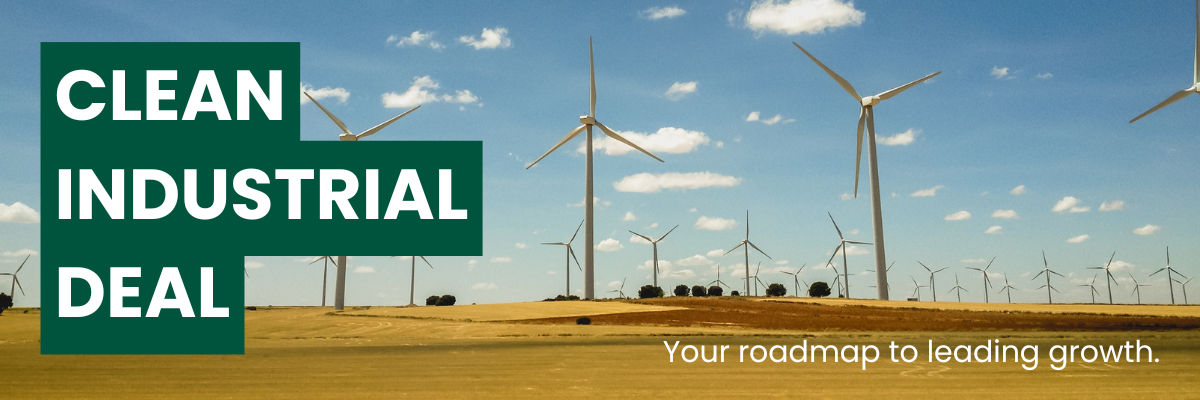
Written by Martijn Meijer
Dear reader,
Welcome to the latest edition of our monthly EU Energy & Climate Policy Update. This month, we take a closer look at the European Commission’s newly released Single Market Strategy, which sets out key policy proposals aimed at strengthening the Single Market’s resilience in the face of today’s challenges. In our Clean Industrial Deal section, we break down the recently launched consultation on the Grid Package – a crucial step toward accelerating the energy transition.
Europe’s bold plan for sustainable growth, the “Clean Industrial Deal”, represents a major shift for EU businesses, especially in energy-intensive sectors. Don’t miss your chance to engage with the Commission to shape this deal and influence the policy direction for the next five years.

The spotlight
European Commission unveils its Single Market Strategy
The European Commission recently unveiled its Single Market Strategy, setting the tone for how the EU plans to strengthen its economic core: from geopolitical tensions to supply chain and digital disruptions. Building on the 2015 framework, which focused on digital harmonisation across EU Member States, this new vision focuses on making the Single Market more resilient in the face of today’s issues.
For businesses across Europe and beyond, the Strategy introduces a new wave of policy initiatives that will shape energy and climate-related policies, providing opportunities and requiring companies to adapt to a changing Single Market.
So what’s behind the renewed strategy, and what could it mean for businesses operating in the EU market? Continue reading this month’s Spotlight to find out!
What’s in the Single Market Strategy?
The Strategy focuses on five key areas: (1) eliminating barriers in the Single Market, (2) European services markets, (3) supporting SMEs, (4) digitalisation across the Single Market and (5) effective enforcement of Single Market rules.
- Eliminating barriers in the Single Market: From fragmented rules to excessive red tape, ten persistent barriers continue to hold back the Single Market—and with it, progress toward a greener, cleaner economy. The European Commission aims to tackle these “terrible ten” with a series of streamlining measures. These include an Environment Omnibus to harmonise Extended Producer Responsibility (EPR), a new “28th regime” to simplify company formation and scaling, and a review of the Standardisation Regulation to accelerate innovation across borders. The message is clear: cut complexity, unlock clean growth.
- European services markets: Clean tech needs clean service markets. Think installation, maintenance, digital and grid infrastructure. Expect tailored reforms in energy services, with the European Grids Package (see our Clean Industrial Deal section for more insights), Citizens Energy Package, and a White Paper on market integration leading the charge.
- Supporting SMEs: Small and medium-sized enterprises (SMEs) are key drivers of the energy transition, yet they often face disproportionate regulatory and financial challenges. Alongside the recently published fourth Omnibus package on small mid-caps (SMCs), the Strategy proposes extending the SME Fund for 2026–2027, including support for intellectual property registrations like geographical indications. It also introduces a voluntary framework to help SMEs disclose sustainability efforts and access green finance through updates to the Taxonomy Disclosures Delegated Act. These steps aim to make it easier for start-ups to scale breakthrough clean technologies such as carbon capture and green hydrogen.
- Digitalisation across the Single Market: Digital solutions are integral to decarbonisation, whether through smart grids, real-time data exchange, or lifecycle tracking of sustainable products. New initiatives such as the European Business Wallet, the EU Digital Identity Wallet, and improved cross-border data exchange systems like IMI, BRIS, and OOTS will empower clean tech firms to operate more efficiently across borders. Moreover, eInvoicing, standardisation, and public procurement reforms will stimulate a digital environment where sustainable businesses can scale faster with fewer administrative barriers.
- Effective enforcement of Single Market rules: Green and clean investments need legal certainty. The European Commission is promising tougher enforcement, faster infringement action, and a Single Market Barriers Prevention Act – all to make sure the rules work as intended and that European businesses can decarbonise while remaining competitive.
Next Steps
The European Commission is preparing policy proposals and will soon launch public consultations targeting sectors like retail, agrifood, construction, transport, telecommunications, and chemicals. With files moving rapidly, this is a crucial moment for industry to engage. Input will be vital to ensure that the policy actions from the Single Market consider your business-specific characteristics.
Publyon’s Brussels network can help your business engage with the right stakeholders at the right time to make an impact.

Impact analysis for your business
Our free policy updates keep you informed, but is that enough? With our tailored EU Energy & Climate Policy Update you’ll receive:
- Custom insights on how upcoming policy changes might impact your business;
- Strategic advice from your dedicated policy consultant on how to turn challenges into opportunities;
- Early warnings about key legislative developments.

Policy updates
New hydrogen projects to receive European funding
On 20 May, the Commission selected 15 projects to receive a total €992 million in financing, with the goal of producing 2.2 million tonnes of renewable hydrogen over the course of ten years. Among the selected projects is the Zeevonk electrolyser in the Netherlands, which is the largest in terms of bid volume for hydrogen production. The other countries selected are Spain, Finland, Germany, and Norway. The bidding was done through the European Hydrogen Bank auction and funding will come from the Innovation Fund, using ETS resources. A third auction is planned later this year.
IEA releases Global Critical Minerals Outlook 2025
On 20 May, the IEA published the Global Critical Minerals Outlook 2025. The report gives an assessment of the latest trends along with their implications, including a continued rise in demand for critical materials. Due to major supply increases led by China, Indonesia and the DRC, prices on key energy minerals declined. This also means that unlike in the energy security world, where diversification of sources has been a key policy instrument, the critical minerals world has become even less diversified and more dependent on a few countries.
EU-UK agreement on energy collaboration and ETS linkage reached
On 18 May, the EU and the UK reached a political agreement to continue, among other collaborations, the post-Brexit energy collaboration and to explore the UK’s possible participation in the EU’s internal electricity market. The UK and the EU will continue technical regulatory exchanges on i.e. hydrogen and CC(U)S. The leaders also agreed to link their two emission trading systems with one another, in order to smoothen trade between the two markets. Other topics they will continue to work on together are security, disaster cooperation, health technologies and competition.
ENVI endorses CBAM simplification
On 13 May, the Parliamentary Environment Committee (ENVI) endorsed the Commission’s proposal to simplify the Carbon Border Adjustment Mechanism (CBAM), limiting its input to three amendments. The simplification of CBAM was part of the first Omnibus package. That means that ENVI approves of the proposed minimum threshold of 50 tonnes for reporting under the CBAM regulation. According to the Commission, this threshold would still cover 99% of emissions from imports, whilst exempting 90% of importers, therefore reducing administrative burdens for smaller companies without endangering climate targets, they argue. The plenary vote is scheduled on 22 May, after which negotiations with the Council can start.
ITRE gives recommendations on European electricity grids
On 13 May, the Parliamentary Industry Committee (ITRE) adopted an own-initiative report urging to modernise Europe’s electricity grids and support the EU’s energy and climate goals. The report calls for the implementation of the EU Grid Action Plan and emphasises the need for substantial investment to upgrade infrastructure, enhance cross-border transmission, and more effectively integrate renewable energy sources. It further highlights the need for clearer procedures to attract private investment alongside public funding, as well as more coordinated pan-European planning to connect national grids, sectors and regions. The final vote in plenary will be on 16 June.

Clean Industrial Deal
Is your business still off the grid? Let’s fix that!
On 13 May, the European Commission launched a call for evidence on the upcoming European Grids Package (Q4 2025), given the crucial role of electricity grids in integrating affordable renewable energy and supporting electrification.
However, there are hiccups
There is a huge gap between what is needed for grid expansion and what is actually being developed. For instance, by 2030, half of the essential cross-border electricity capacity (|32 out of 66 gigawatts) is still unplanned. That gap is only likely to get bigger – it is expected to grow to 37 gigawatts by 2040. And that’s just the start: we have not even touched on the serious concerns around the security of these grids yet.
Additionally, implementation of renewable generation, storage, and infrastructure projects is currently taking too long. Did you know that transmission grid projects often take around 14 years just to catch up with supply and demand? Meanwhile, congestion in local distribution grids does not make things any easier; it drives up costs and leaves many waiting much longer for connection approvals. How do you think we can speed this up?
What does this mean for your business?
Still wondering why gathering your evidence matters? Here is the deal: your input can help create tangible benefits for your organisation! Among others, the Grids Package aims to do the following:
- Economically, it can help accelerate investments in infrastructure, storage, and renewables, boost cross-border energy trade, improve grid efficiency.
- Environmentally, it supports faster integration of renewable and low-carbon energy, electrification of demand, and significant reductions in greenhouse gas emissions; all while maintaining high environmental standards.
- Socially, it means more affordable energy for all (count in yourself!).
- From a business perspective, it’s about cutting through the red tape: simplifying procedures, speeding up permitting, and reducing uncertainty. This means less time lost in bureaucracy and more focus on what matters: getting projects off the ground faster, lowering costs, and unlocking new market opportunities for companies across the energy value chain.
Sounds powerful, right? If you want to know more, get in touch via eu@publyon.com.

Blog
Industrial Decarbonisation Accelerator Act: what you should know and do now
Discover how this upcoming binding legislation, which aims to accelerate decarbonisation of European industry while making the EU more competitive, matters to you and your business.
READ MORE





